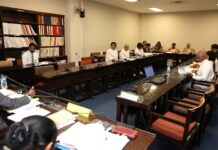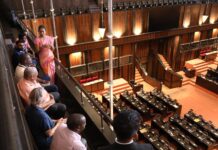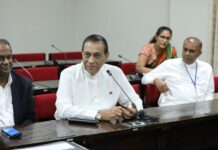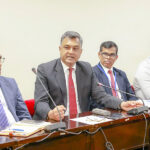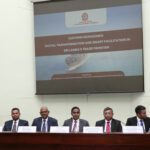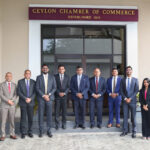President Gotabaya Rajapaksa has appointed a Presidential Task Force to transform Sri Lanka’s economy into a green socio-economy with sustainable solutions to climate change.
The Task Force has been named as the ‘Presidential Task Force on Creating a Green Sri Lanka with Sustainable Solutions to Climate Change’.
The Task Force, chaired by Basil Rajapaksa, the Special Representative of the President, consists of 46 members including five Cabinet Ministers, a Governor, 14 State Ministers and one female Member of Parliament.
The other members of the Task Force are: Ministers – R. M. C. B. Ratnayake, Chamal Rajapaksa, Mahinda Amaraweera, Mahindananda Aluthgamage and Dr. Ramesh Pathirana; Governor Anuradha Yahampath; State Ministers Duminda Dissanayake, Arundika Fernando, Roshan Ranasinghe, Kanaka Herath, Janaka Wakkumbura, Mohan de Silva, Wimalaweera Dissanayake, Kanchana Wijesekara, S. Viyalanderan, D. B. Herath, Shasheendra Rajapaksa, Dr. Nalaka Godahewa, Dr. Seetha Arambepola and Prof. Channa Jayasumana; MP Manjula Dissanayake, Dr. M. W. N. Dharmawardena, Jayampathy Molligoda, Jayantha Wickramasinghe, Prof.Sudheera Ranwala, Dr. G. A. S. Premakumara, Dr. Anuruddha Padeniya, Dr. D. M. J. B. Senanayake, Prof. S. Ananda Kulasuriya, Dr. T. L. Gunaruwan, Prof. P. I. Yapa, Dr. H. M. G. S. B. Hitinayake, Dr. Azeez Mubarak, Dr. Yasantha Mapatuna, Dr. Krish Dharmakeerthi, Sachithra Yapa, Wicky Wickramatunga, Herman Gunaratne, Dhammika Kobbekaduwa, Devaka Wickramasuriya, Jeevaka Atapattu, Dilshan Fernando, Mohamed Anees Junaid, Dilith Jayaweera and Vijith Welikala.
The Cabinet approved the overall policy framework and proposals contained in the Cabinet Memorandum submitted by President Gotabaya Rajapaksa on April 27 to transform Sri Lanka towards a green socio-economic model with sustainable solutions to climate change.
The President has received a resounding mandate to overcome the challenges in the areas of biodiversity, use of fertilizers, land, atmosphere, waste disposal, industries, renewable energy, settlements and urbanization, and environmental education as emphasized in the ‘Vistas of Prosperity and Splendour’ policy framework.
At present, state funds are being spent in large amounts for chemical fertilizers, herbicides and pesticides. People are losing their livelihoods and their health is deteriorating due to the diseases caused by polluted rivers, lakes, sluices and soil pollution. Difficulties in obtaining non-toxic foods are also increasing.
The Presidential Task Force has been appointed with the objective of achieving a number of eco-friendly objectives including saving foreign exchange outflows within the country, enabling the country to achieve a high advantage in the emerging global economic pattern and preparing the people for an eco-friendly socio-economic model. The Task Force has a responsibility to pay special attention to 24 other issues in relation to the environmental protection.
Another main responsibility of the Task Force is to prepare a roadmap for the complete transition from chemical farming to organic farming using organic fertilizer products instead of chemical fertilizers, pesticides and herbicides.
The President has directed the Task Force to coordinate with the Task Force on Economic Revival and Poverty Eradication and the Presidential Task Force for ‘Gama Samaga Pilisandara’ (Dialogue with the Village) Rural Development.





